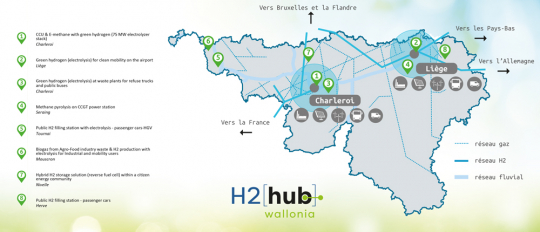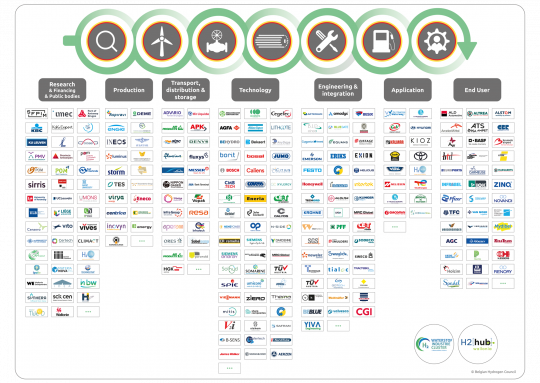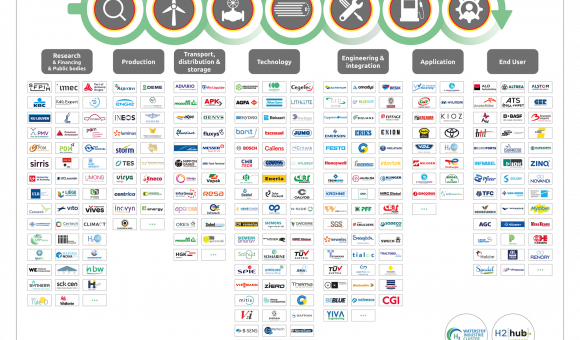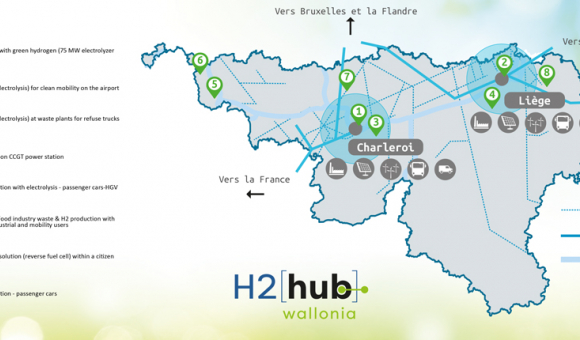
Green hydrogen is an essential energy vector for decarbonizing industry and transport. To play a central role in this transition, European countries and regions must both be able to produce hydrogen and adapt their infrastructure for its transport and distribution. Wallonia is already working on both aspects. In this transition, Wallonia positions itself as a key player thanks to its transport and distribution infrastructure, as well as its local hydrogen production capacity. Its geographical location at the heart of Europe makes it a strategic hub for hydrogen logistics, further strengthened by a dynamic industrial ecosystem and ambitious investments.
An Ideal Geographic Location and Suitable Infrastructure for Hydrogen Distribution
Wallonia is ideally located to play a central role in hydrogen distribution across Europe. It is in close proximity to major industrial areas in France, Germany, and the Netherlands—three major markets for hydrogen. But that’s not all. Cédric Brüll, Managing Director of the Tweed Cluster, currently attending the Hyvolution international hydrogen trade fair, highlights that Wallonia is already leveraging its logistical strengths. "We can rely on the presence of navigable waterways and a dense highway network, which are key assets for establishing a hydrogen hub tailored to heavy mobility applications. The planned investments in hydrogen pipeline networks (H2 pipes) and its central positioning will enable efficient hydrogen transport to major European consumption centers."

© H2 Hub Wallonia
A Rapidly Expanding Local Production Capacity
In addition to its logistical advantages, Wallonia stands out for its ability to produce green hydrogen locally. The region is home to leading companies in electrolyzer manufacturing, such as John Cockerill, which plays a central role in deploying green hydrogen production technologies.
Cédric Brüll emphasizes: "In Wallonia, we are both a major center for green electrolyzer production—a world leader in manufacturing (with John Cockerill, editor’s note)—and we have a strong ecosystem of SMEs (e.g., in power electronics), meaning we have the entire value chain in place. Additionally, we are strategically positioned near the Port of Antwerp-Zeebrugge, Germany via Liège Cargo Airport, and France with its road and river network."
Ambitious projects, such as Vallhyege (Colruyt/Virya Energy - see below), leverage this capacity by developing green hydrogen production units powered by wind farms (up to 2,500 tons of H₂ production expected). This approach integrates local production with efficient distribution, making Wallonia even more attractive to investors and industry players.
A Dynamic Industrial and Technological Ecosystem
Wallonia has successfully built a strong innovation ecosystem around hydrogen. Research centers such as Cenaero, CRM Group, GDTech, Mitis or BeBlue Cryotech are developing advanced solutions for hydrogen production, storage, and utilization.
Additionally, clusters like TWEED facilitate collaboration between startups, SMEs, and major industrial groups. However, challenges remain, as Cédric Brüll explains: "The challenge now is to develop large-scale projects and establish a mature value chain. Many SMEs can add value to the ecosystem and help complete the value chain, just as we see in the automotive industry. There is still a gap between large industrial players and SMEs that needs to be bridged."

© Belgian Hydrogen Council
Political Commitment and Adapted Infrastructure
The Walloon government actively supports hydrogen development through ambitious strategies, such as the Strategic Innovation Initiative (IIS) for hydrogen. At the same time, infrastructure projects like H2Hub Valley strengthen Wallonia’s hydrogen storage and distribution capabilities, further cementing its role as a European hub.
Outlook
With its strategic position at the heart of Europe, adapted transport and distribution infrastructure, and green hydrogen production capacity, Wallonia is emerging as a key hub for the future of hydrogen in Europe. By investing in this clean energy, it contributes to the continent’s decarbonization while attracting investment and creating jobs. The future of hydrogen in Europe will depend on strategic hubs capable of ensuring efficient production and distribution. Wallonia is ready to take on this challenge and establish itself as a key player in Europe’s energy transition.
Focus on ... VALLYEGE and its 25 MW Project
The Vallhyege project (€60 million), led by Colruyt and John Cockerill with €25 million in funding from the Walloon Region, aims to transform Wallonia into a "hydrogen valley." Selected by the Walloon government, this project will be developed in Engis (Liège) by Virya Energy and will be Wallonia’s first green hydrogen production unit, with an initial capacity of 15 MW (1,500 tons of low-carbon hydrogen), expandable to 25 MW.
The hydrogen produced will supply local infrastructure, including a barge and a heavy-duty road station at Trilogiport, the DATS24 station in Herve, and potentially a future station at Liège Airport. This project strengthens Liège’s already dynamic industrial ecosystem, featuring key players such as CRM Group and John Cockerill, positioning the city as a strategic hub for hydrogen consumption, particularly for heavy industry and logistics.

